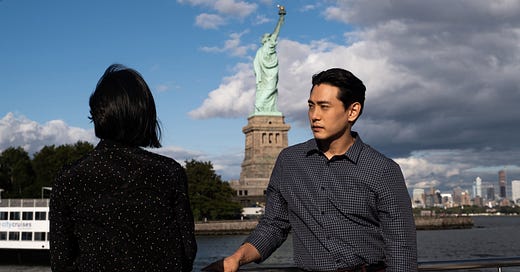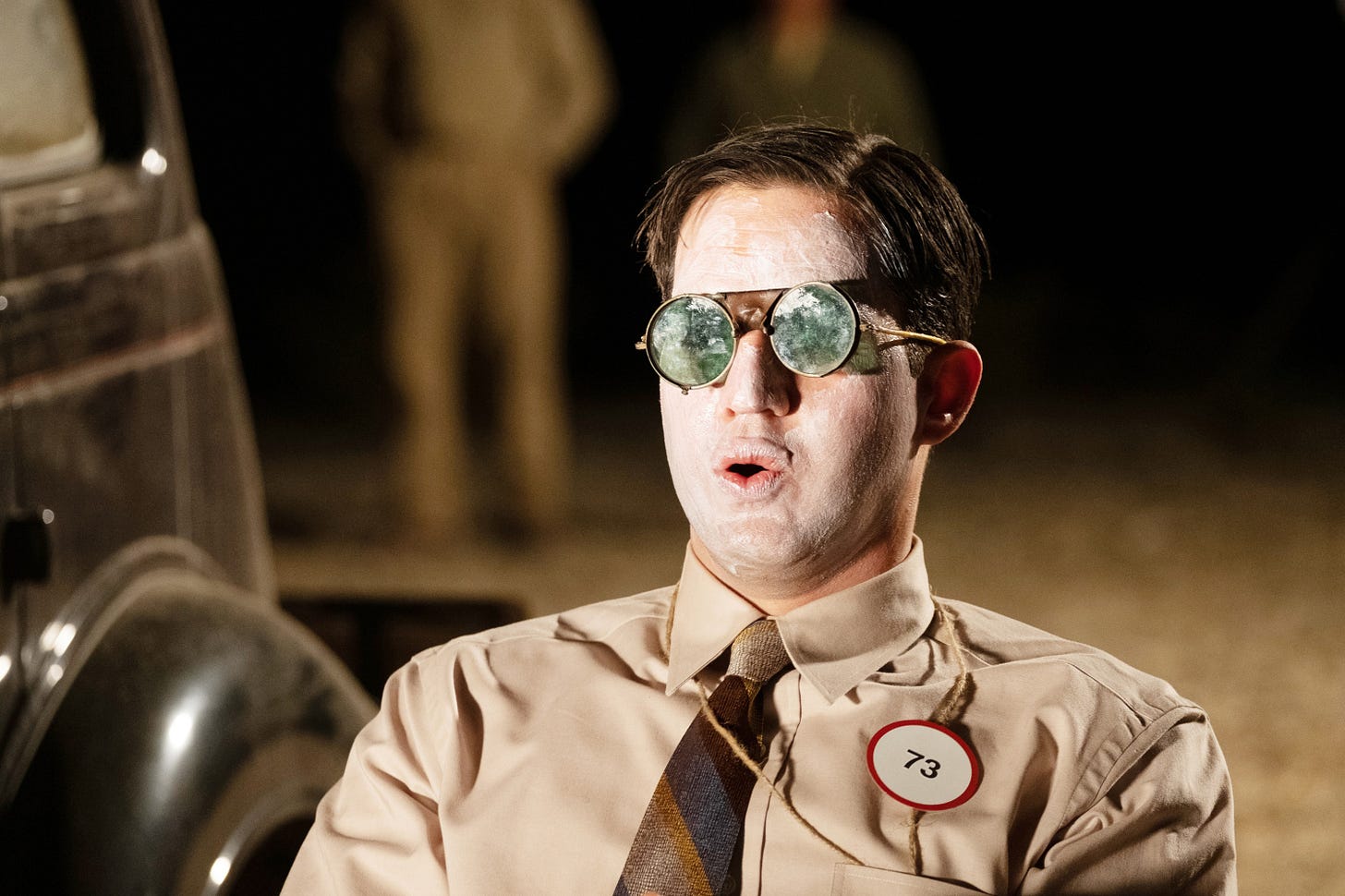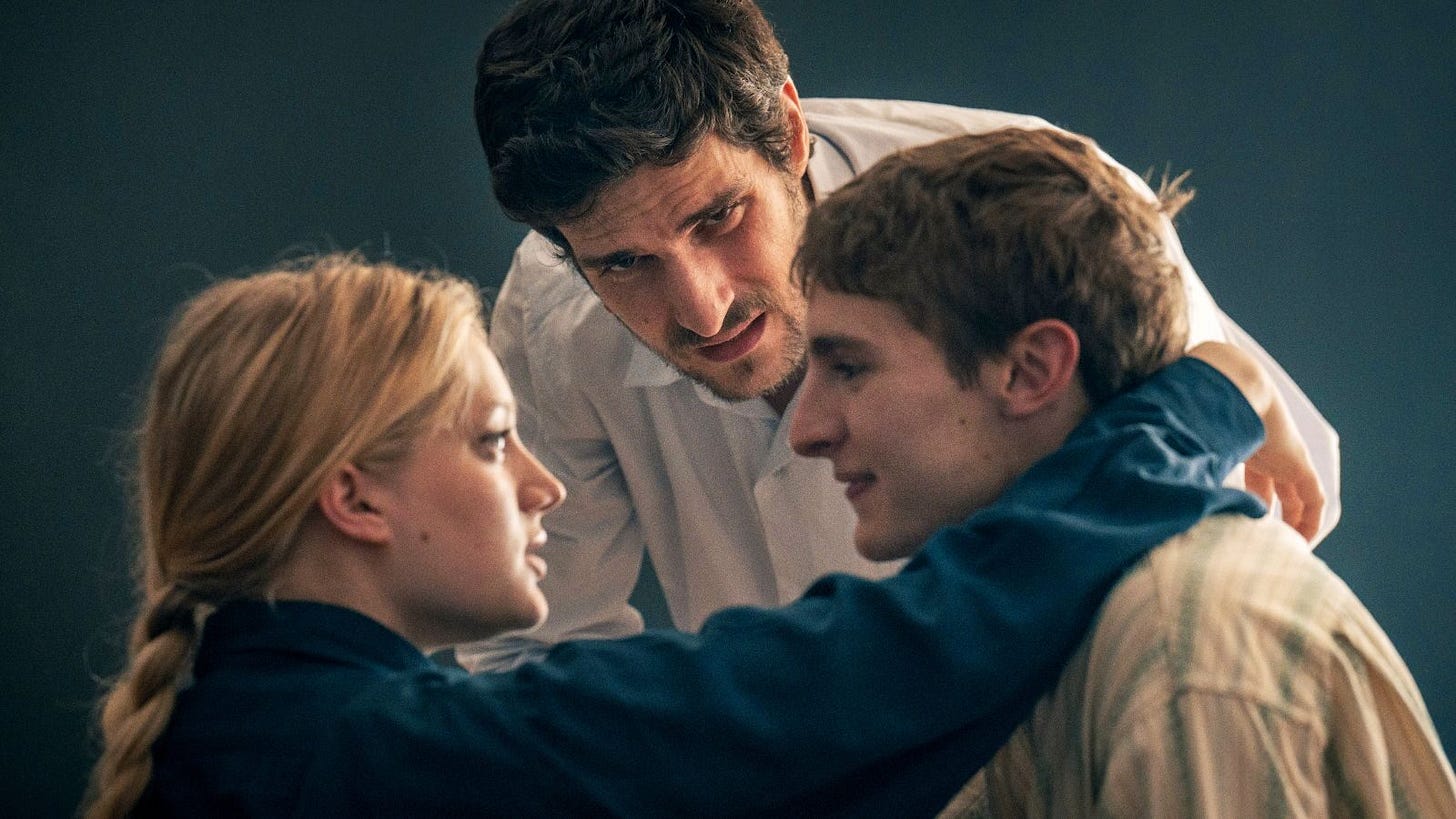Past Lives Couldn’t Ever Hold Them Down, Weekly Reel #58
One of the most anticipated films of the year alongside one of the most condemned films of the year, along with yet another Oppie shout-out, which deserves it.
News of the Week: Back to regular programming, which should pick up this fall season, unless literally everything gets delayed because of the strikes. As of now, Dune 2 and Challengers have been pushed to next year.
Watch Now
I haven’t seen anything good enough to recommend since Oppenheimer, so I’ll link the original review here. I’ve seen it another two times since writing this and could write another longish review on the many other aspects I didn’t mention. I still have a Save for Later and Pass, so stay tuned.
Save for Later
Past Lives (2023, Celine Song, USA) tells the classic story of two people, in love in the past, meeting years later with the double hindrance of time + another person blocking their romantic reunion. This sub-genre was perfected in literature by Willa Cather while cinema was still a child, then given the nouvelle vague treatment by Jacques Demy in The Umbrellas of Cherbourg—the direct ancestor of La La Land, perhaps the peak audiovisual use of this story device. Even indie singer-songwriter Børns wrote the song “Past Lives” with a chorus that could’ve been the elevator pitch for Celine Song’s debut feature:
Past lives couldn't ever hold me down
Lost love is sweeter when it's finally found
I've got the strangest feeling
This isn't our first time around
Past lives couldn't ever come between us
Some time the dreamers finally wake up
Don't wake me I'm not dreaming
Don't wake me I'm not dreaming
Past Lives, the film, undercuts this romantic, should’ve-been-together narrative contrivance through self-aware winks and nods. This begins in scene one with Hae Sung (Teo Yoo), Nora (Greta Lee), and Arthur (John Magaro) sitting at a bar at four A.M.; the camera is sitting on the other side and an O.S. couple are trying to guess the configuration of the trio—they incorrectly guess Hae Sung and Nora are siblings, and that Arthur is their city tour guide. Hae Sung and Nora are sitting facing each other, deep in conversation, while Arthur is third-wheeling (linguistically and financially, as we later learn). Then the story rewinds and starts from the beginning, in Korea, twenty-four years earlier, where Hae Sung and Nora are competitive classmates who walk each other home. They go on a date, with chaperoning mothers, and are infatuated with one another. Nora’s mother tells Hae Sung’s that they’re moving to provide Nora with a better upbringing—Nora wants to win the Nobel Prize in Literature, which, she says, never goes to a Korean. They settle for Canada around the turn of the millennium, a county that didn’t have a Nobel winner until Alice Munro became one thirteen years later.
The plot is split between two twelve year intervals, using this superior highly composite number, applied to many calendars and time units, to balance the otherwise tricky uncertainty of human relations over time. In 2012 Nora, living in New York as a playwriter, reconnects with Hae Sung on Facebook as a fluke, finding that he had commented on her father’s post asking about her. They reconnect through Skype, time zone differences (Seoul is thirteen hours ahead of NY) be damned, but can’t find the time to travel to each other’s city. Nora, feeling the need to be with each other in person, cuts off contact so she can focus on her writing. Soon after, Nora meets Arthur at a writer’s residency in Montauk, whom she marries several years later. Twelve years after their Skype convos—now in 2024, making this a science-fiction film?—Hae Sung unexpectedly visits Nora in New York.
From this moment on, Song subverts expectations as much as possible. Like with in-yeon, the Korean interpersonal concept of destiny brought up multiple times, which Nora explains is just a silly device to sleep with people but is actually the anchor point of our past lives, Song undermines the serious drama to create a more natural depiction of the awkwardness associated with a long-lost, what-could-have-been, one-who-got-away love in the contemporary world—best exemplified in a meta-nod to the audience rant that Arthur goes on in bed with Nora. But in the end, their facetiousness turns back into sincere, ineffable longings. Past lives, as a zeugma, comes and goes with the same fleetingness as Arthur’s book title, “Boner,” which lands like a dull dumpf along with the rest of the film’s situational humor. The conversation between Hae Sung and Nora at the bar, the one that opened the film (and one that Song visually but not content-wise had when she met with a Korean friend at a NY bar with her American husband), revolves around a kind of banal multiverse theory of love: maybe we were lovers in a past life, maybe this is a past life for us and we’ll be lovers in the future…
There’s a peculiar open-endedness that feels unique to the story but isn’t fully delivered. (Random thought: the story should’ve gone another twelve years, where Arthur turns into a washed up writer and Nora is the bread-winner, then another twelve years, where they’re trying to figure out how they’ll retire without having built up pensions from writing careers.) Like Teo Yoo’s depiction of a Korean man, who was born and raised in Germany before moving to NY to pursue acting, Song pulls a nifty sleight-of-hand by presenting an authenticity to a story loaded with tropes, especially the final, tense moments of Hae Sung’s visit.
So, what is the film saying about past lives, relationships, the influence of time, maybe even the concept of soul mates? Not much, a shrug of the shoulder. Life happens, and that’s that. Who knows what could have been, it’s a fun topic to discuss between two and four A.M. but doesn’t lead anywhere. Some might find solace in this “realist” position on relationships. To get there, Song employs the genre clichés before pulling out the resolution football. She isn’t exactly having her cake while eating it at the same time, but she isn’t not having and eating it at the same time. It's the kind of story that could have benefited from having much more said between Hae Sung and Nora, or much less. In short, Song goes for the more realistic, subconsciously emotional resolution that can’t be rendered in words while also riding a wave of artificial signifiers—if I may: a signifier without its signified.
Like with Aftersun last year, this debut feature from a young writer-director is the industry’s crowning indie achievement of the year that will unlock more opportunities for Song and the cast.
Past Lives is playing in theaters in Europe and on VOD in the U.S.A.
Pass
Forever Young (2022, Valeria Bruni Tedeschi, France/Italy) would’ve been a pass even without the indictment against the male protagonist for physical abuse against multiple women, and the writer-director’s relationship with him at the time of shooting with the allegations known, and her alleged code of silence regarding the matter on set. It’s basically the French version of Don’t Worry Darling. What could have been a strong career-push for the talented César winner Nadia Tereszkiewicz (great in Only the Animals and so-so in The Crime is Mine) turned into the French Corsage, and, more specifically, unfortunately turned into accused men ruining what should have been a collaborative art form that everyone—production crew and viewers—could enjoy.
Beyond that gaping elephant in the room, Forever Young still isn’t good. The plot is about a group of young theater students in the nineteen-eighties challenging themselves at an élite theater school in Nanterre. We follow Tereszkiewicz’s struggle with maintaining a relationship with you-know-who, the students are highly neurotic, and there isn’t a story or character arc within sight. (The unseen wife of one of the students has a baby then dies because of AIDS, which is the closest any character in the film gets to an arc.) The other big problem is that like Asteroid City, there’s a bunch of side characters playing in an ensemble; but unlike Asteroid City, they all think they’re the main character of the film and have their acting dials turned up to eleven. The actual “protagonist” of the film (Tereszkiewicz) is the one-dimensional girlfriend side character, her boyfriend is the character actor drug-addict, and not even the second act inclusion of Louis Garrel could provide enough seasoning for the dish.
Thank you once again for checking out my Substack. Hit the like button and use the share button to share this across social media. And don’t forget to subscribe if you haven’t already done so.







You and I value "Past Lives" equally, but you have concerns that I don't. Doesn't a failure of open-endedness to "fully deliver" mean, merely, that the conclusion is open-ended? We don't know what Nora and Hae Sung will do or feel in the future, and neither do they. They're in the hands of a larger force that they can't quite fathom, which is what the movie wants us to grasp. It's sad yet at the same time enormous, universal, unanswerable. We struggle with that vast mystery and so do they. Also, if the signifiers are "artificial", why are we moved by this story at all? My review is here: https://moviestruck.substack.com/p/past-lives-2023